
































By Summer Stevens summer.stevens@ thecoastlandtimes.com
When researching what qualities to look for in a pet sitter, who better to ask than Rover.com’s top reviewed pet sitter on the Outer Banks? Lyndsay Burr has more than 100 5-star reviews, and for good reason.
She is thorough, dependable, kind and sends adorable photo collages to owners while they’re away. Some clients refer to her as their pets’ fun auntie.
The Coastland Times sat down with Burr to hear how she got started as a pet sitter, and what questions to ask a potential sitter.
In middle school, she found a litter of kittens whose mother had died. She fostered the kittens, keeping one and finding homes for the other three. Though she’d always loved animals as a child, it was at that moment she became, as she describes, “the crazy cat lady.” Her family would look after pets in the neighborhood when their owners were on vacation, and vice versa. “I never imagined this would turn into a job,” she said. “I got into it by accident and it just grew organically.” She was volunteering
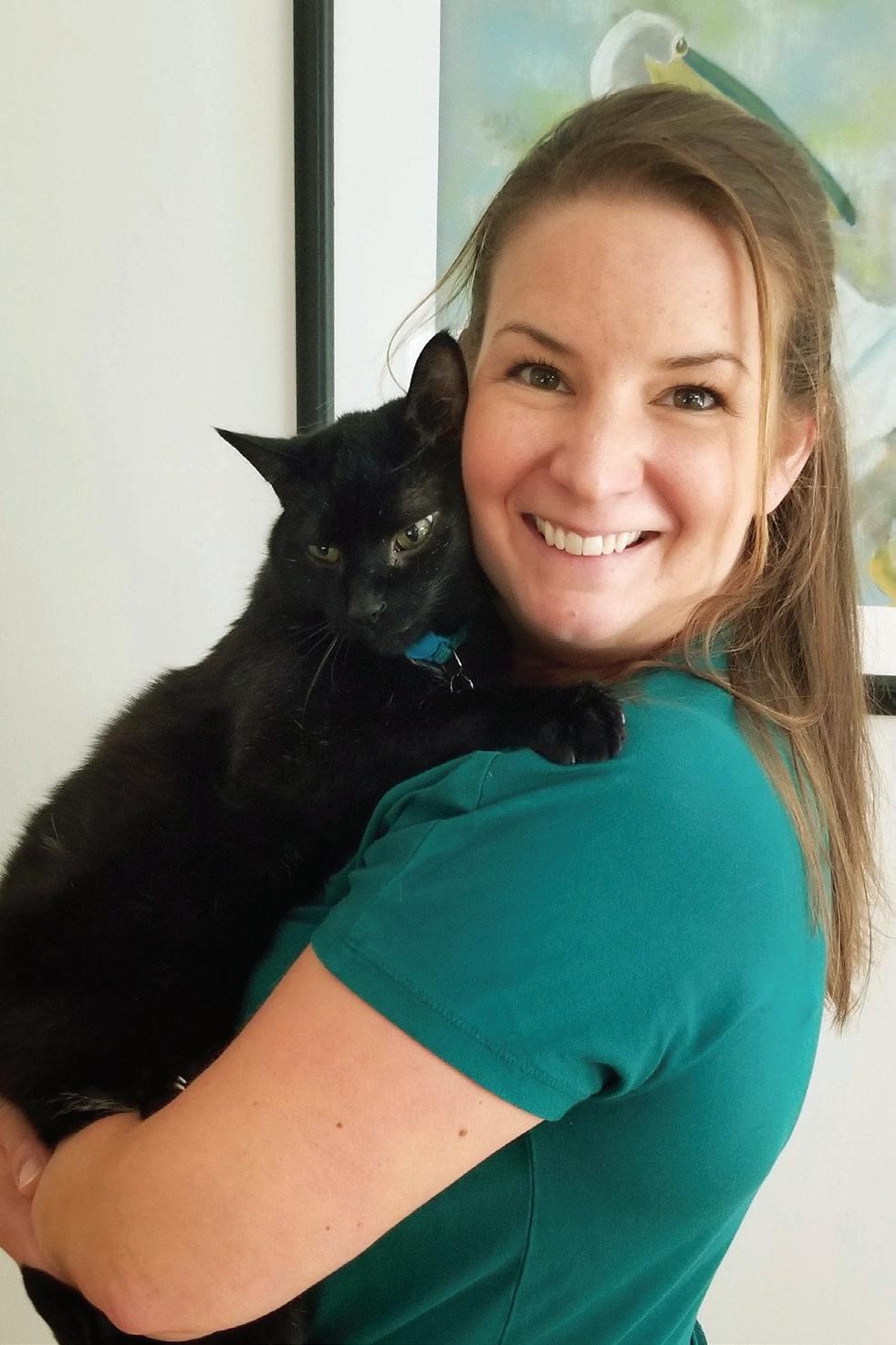
commonly, through personal referrals. Burr offers drop-in visits and dog walking, and occasionally overnight pet sitting for established clients. On a typically busy day, she might stop and see as many as 10 animals throughout the day.
“I feel like I spend as much time in my car as I do with pets!” she said. When she meets a family for the first time, she comes with a list of questions. This list has grown over the years to include everything she needs to know to care for someone
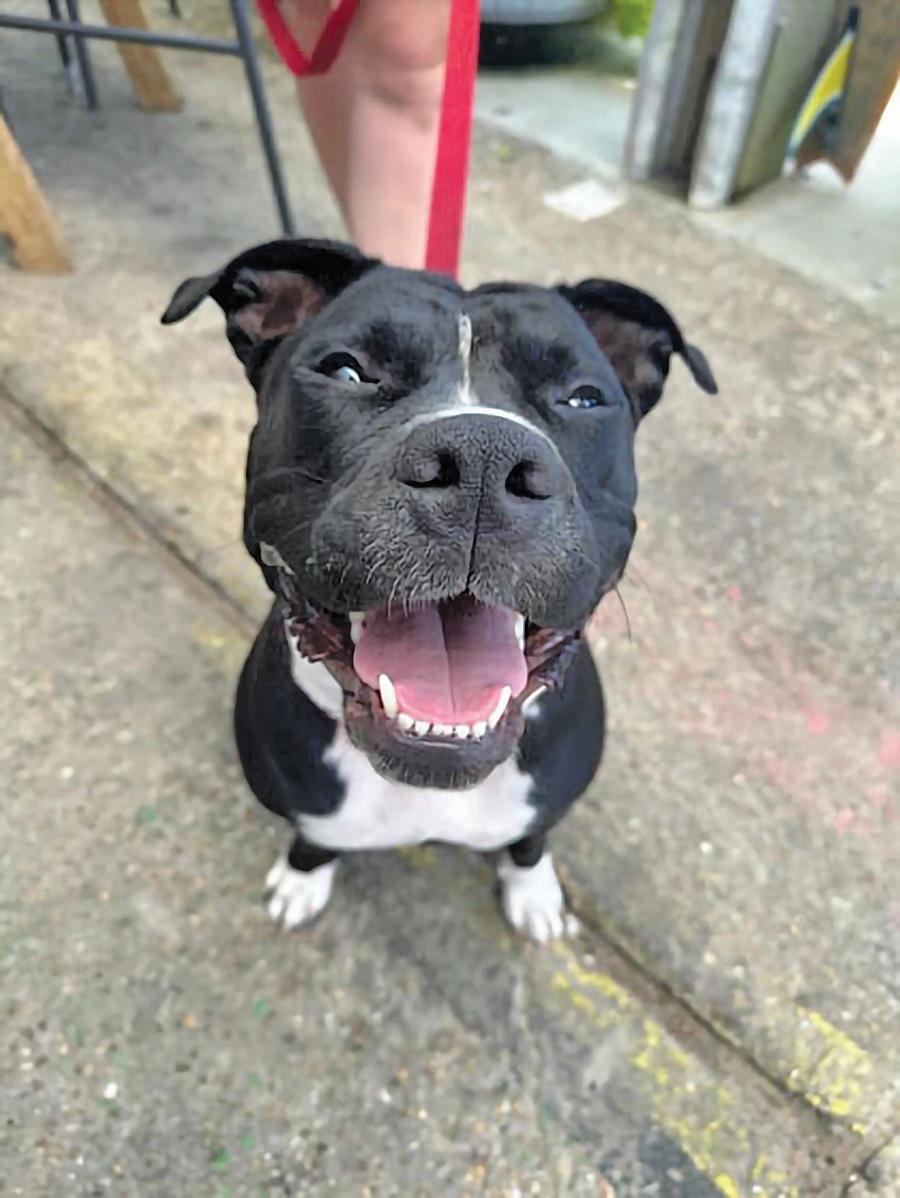
with the adoptable SPCA cats at PetSmart. “I would come home and gush about all of these adorable cats and my husband encouraged me, saying, ‘You’re already doing this anyway. Why not sign up for a Rover profile?’”
Four years ago, the Pennsylvania native created her online profile on Rover.com. Within weeks, she was getting contacted about her services. People find her on her website (sandbarks.com), on her Rover profile, or most
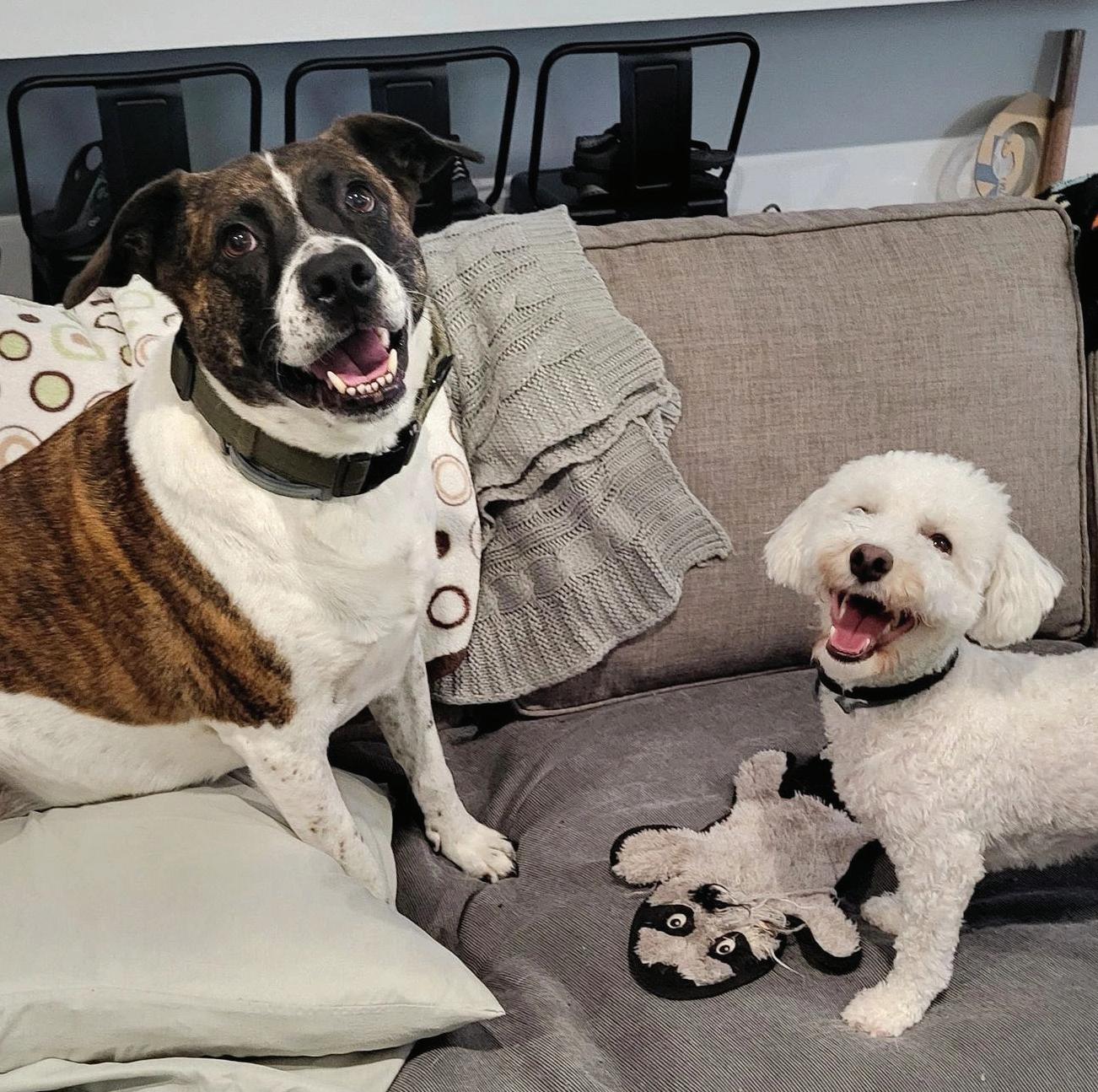








else’s pet. Here is some important information about your pet and your home to share when working with a pet sitter: • Pet’s age, weight, breed, coloring (if caring for multiple pets, Burr

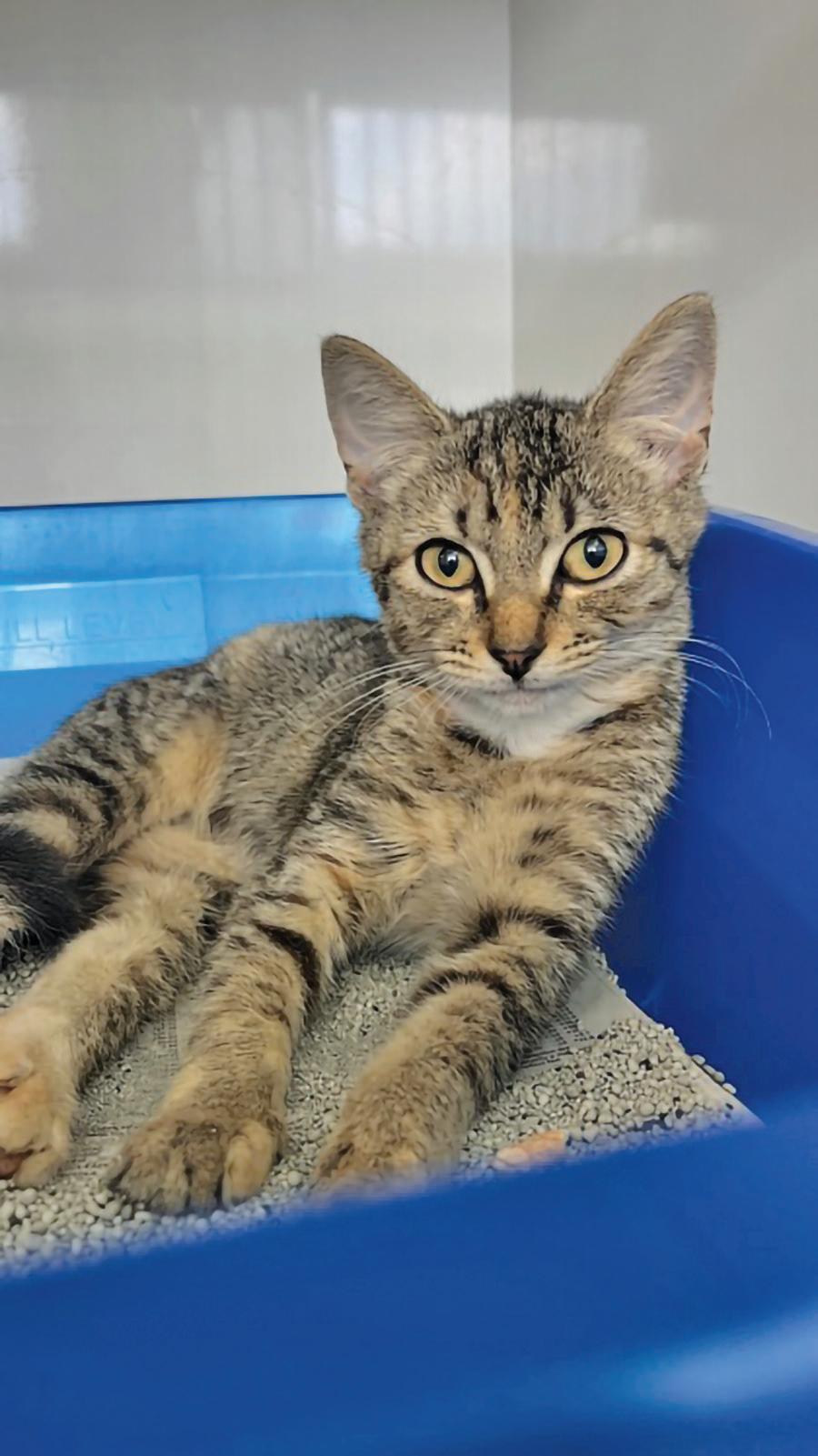
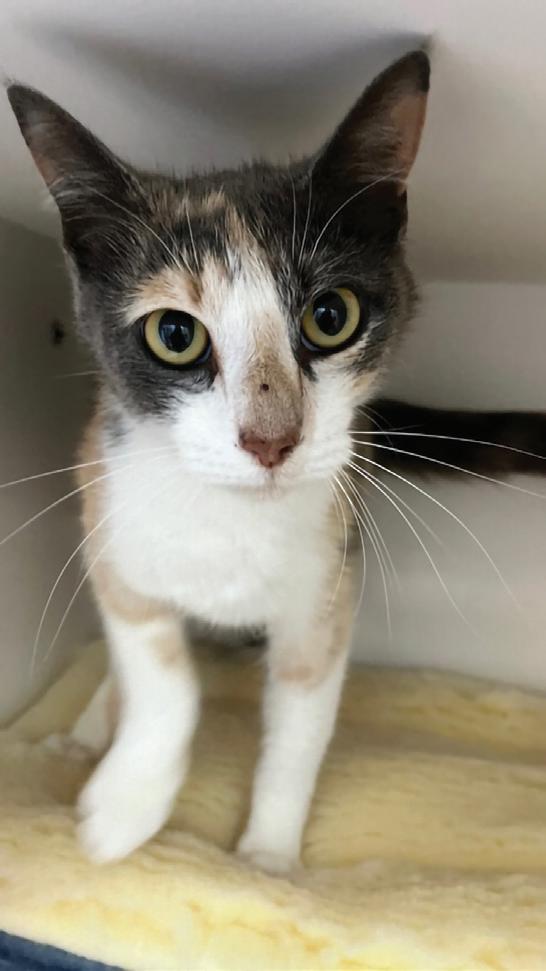
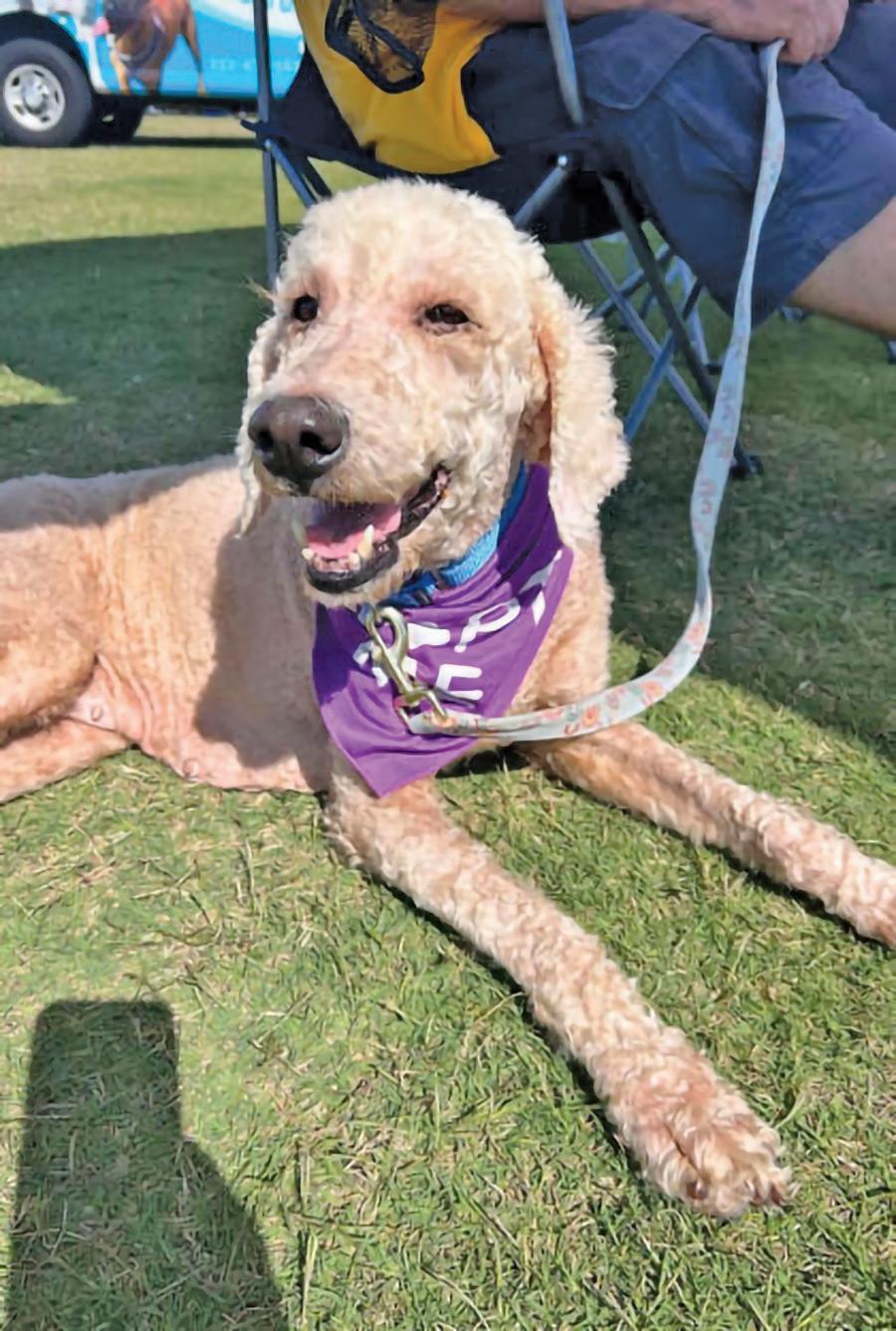
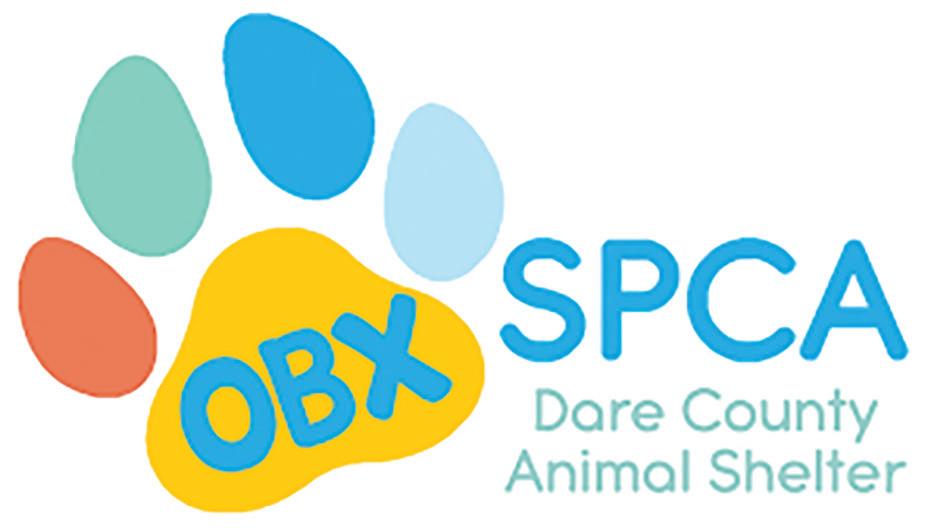




SATURDAY, SEPTEMBER 7, 2024 10am–1pm |


































































As the dog days of summer wind down, the Soggy Doggy Pool Party returns to the Outer Banks Family YMCA! For the fifth year in a row, pups of all sizes can jump in for an afternoon of splashfilled fun.
The event is a grand finale to the outdoor pool season and invites dogs to take a refreshing dip in the outdoor pool for a $10 donation. All proceeds from the doggie dip will benefit the Coastal Humane Society Emergency Assistance Fund, which provides vital services
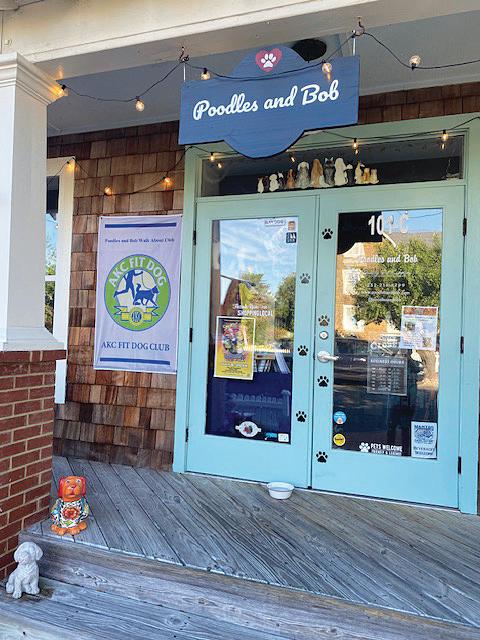
such as spaying, neutering, low-cost vaccinations, and emergency medical care for pets in need. This year’s event also features a dog and car wash, with proceeds supporting the Outer Banks YMCA swim team, giving young swimmers the tools they need to succeed both in and out of the water. It’s the perfect way to keep both your pup and your ride clean while contributing to two great causes.
“This event is always a highlight of the year,” said Outer Banks Family YMCA aquatics director Sam Wills. “Last year, we raised over $1800, and it’s incredible to see the community come together for such a fun and meaningful cause. We’re looking forward to an even bigger turnout this year!”
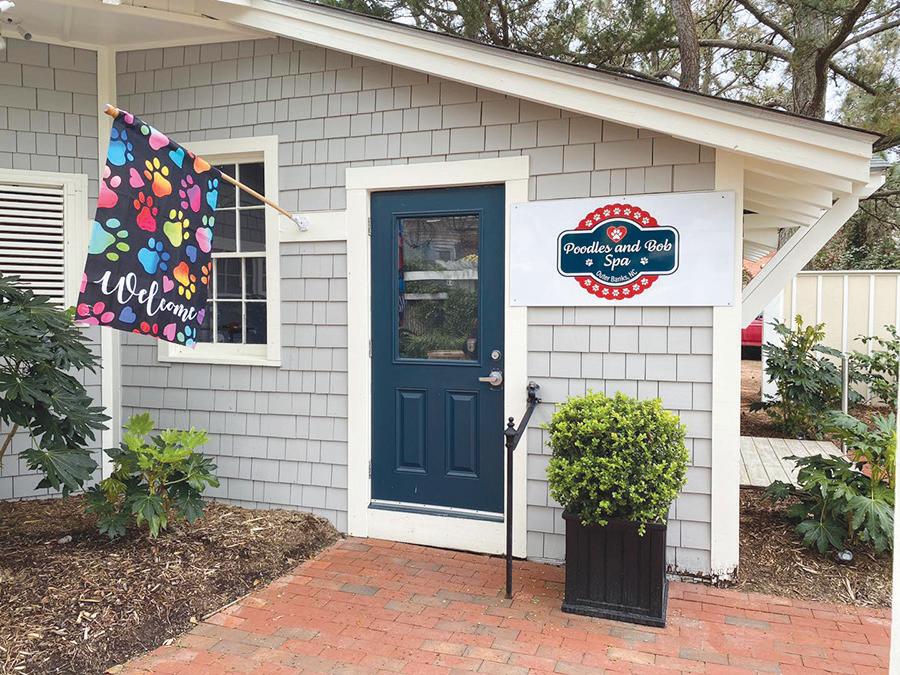
The Soggy Doggy Pool Party will be held September 7, 2024 from 10 a.m. until 1 p.m. at the Outer Banks Family YMCA, located at 3000 South Croatan Hwy in
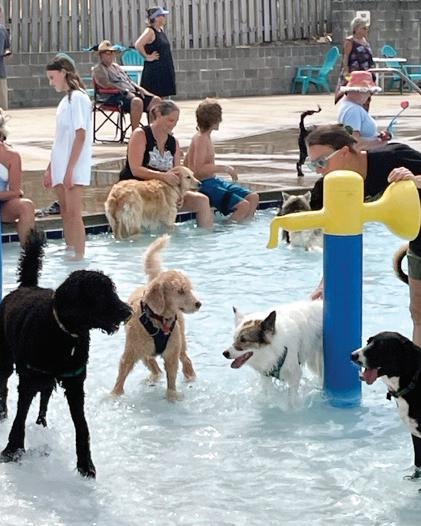
Nags Head. No reservations required; $10 donations will be accepted by cash or check.
For more information about the YMCA of South Hampton Roads, go to ymcashr.org.
By Bill Coleman Outer Banks SPCA


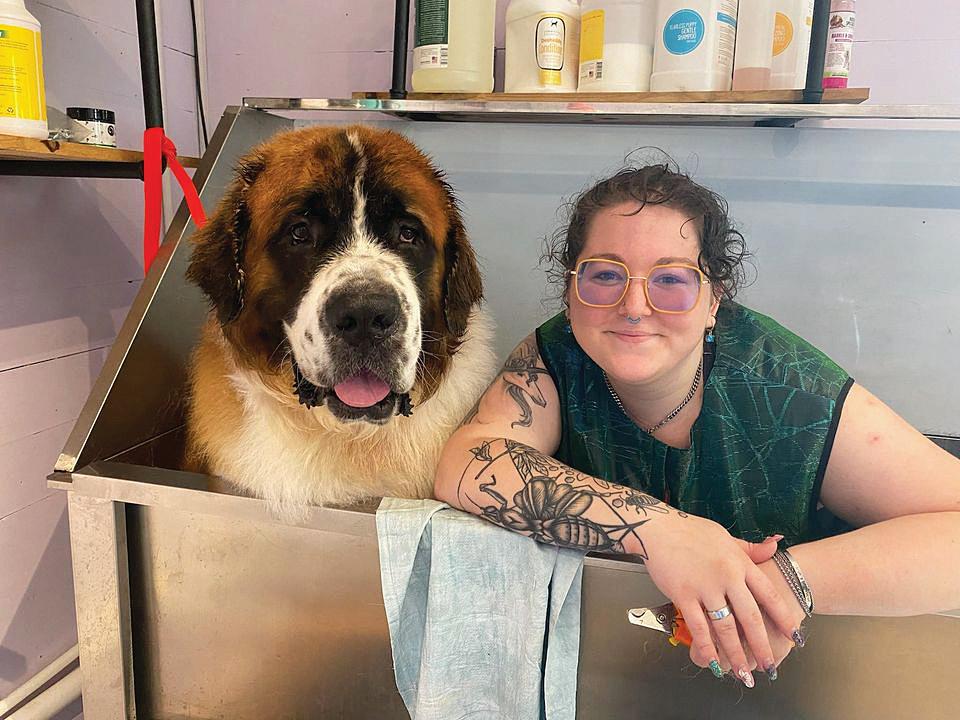
At the Outer Banks SPCA, we care for animals who have no one else to turn to. While some animals already have loving homes and others can safely rejoin the community, many need extra care, attention and a new home. They may be older or unable to fend for themselves. We help them find the perfect place to call home.
Why should you adopt and not shop?
You are saving a life. This may be the biggest reason of all. You’re giving an animal a second chance at life. In their past life, some may have been abused, abandoned or had to fend for themselves on the streets. By adopting, you are giving the dog a safe and loving home in which it can learn to be a happy and healthy dog again.
You won’t be supporting backyard breeders
Many dogs are forced to breed as often as possible and kept under cruel conditions in puppy farms. By choosing to adopt, you are avoiding these organizations and supporting animal welfare in the process. You help prevent overpopulation By choosing to adopt rather than go to a shop or breeder for a specific type of pet, you are caring for a dog that already needs support, instead
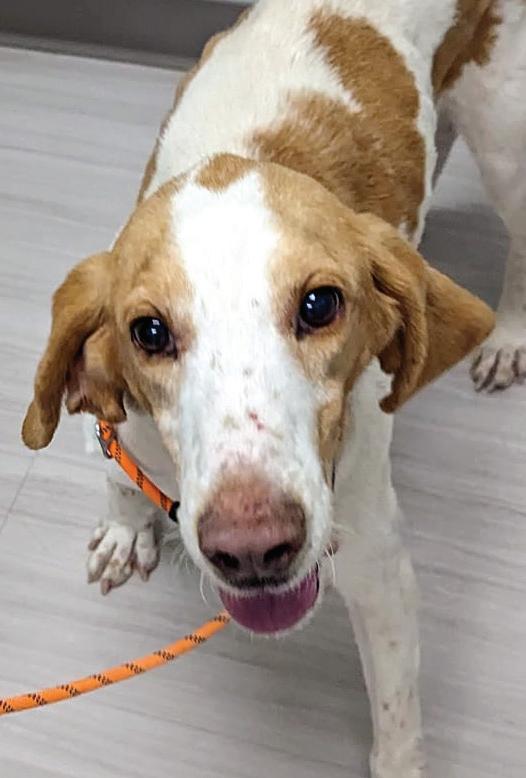
of bringing another puppy into the world. It’s one of the best ways to help ensure all animals can receive the care they deserve.
You might find your dream pet
There’s a good chance you’ll find the one that fits into your family just right.
After spending time at our shelter, you may also find that the pet you fall in love with is completely different from the one you thought you wanted.
You gain the advantages of an adult dog
Many dogs at the Outer Banks SPCA are adolescent or adult dogs, rather than puppies. This means they are likely to already know some basic commands or be housetrained, making your life a lot easier when you bring your dog home.
You get the support of Outer Banks SPCA employees
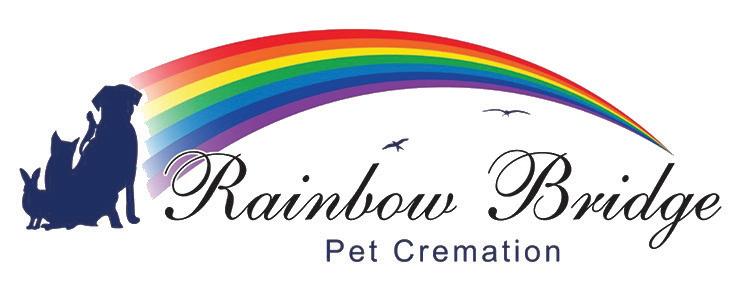
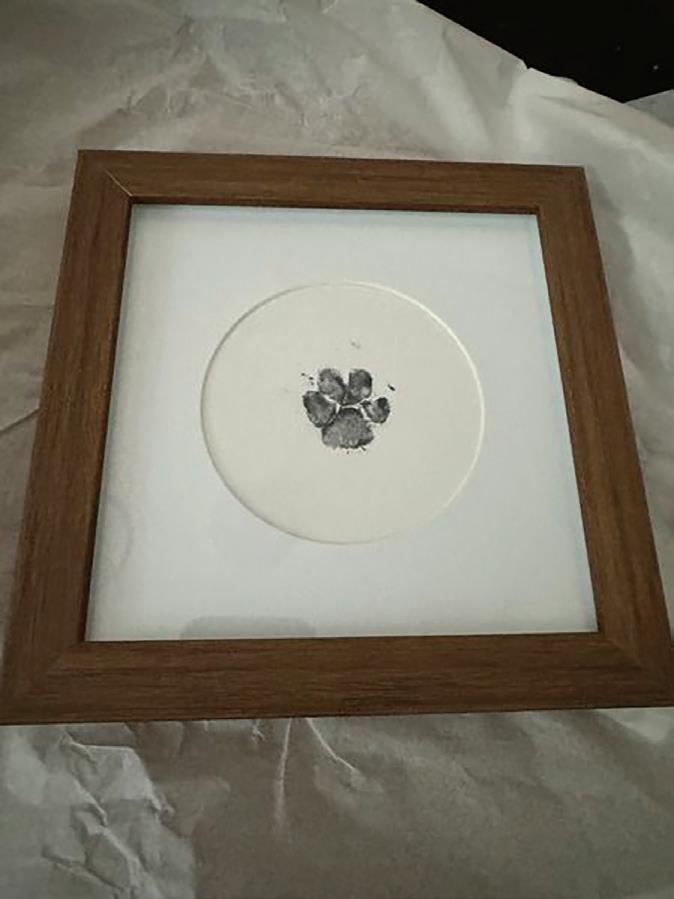

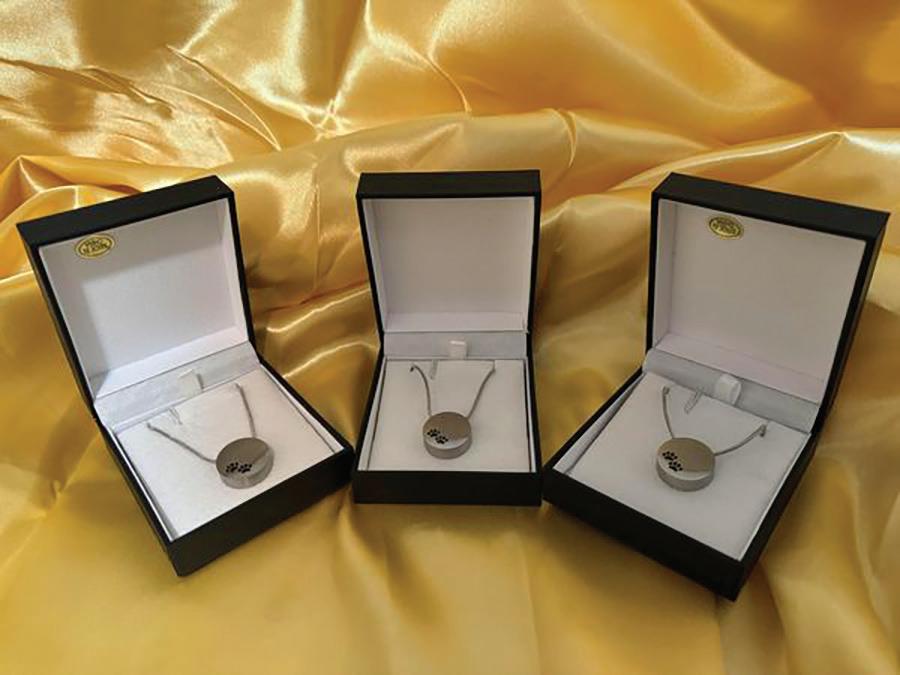

No one knows more about the dog you are adopting than the people who work at the Outer Banks SPCA each day, providing care and support for them. They will be able to assist you with the move and help you carry on any training or behavior work.
You adopt a healthy pet
The Outer Banks SPCA provides excellent medical treatment and necessary vaccinations. They will be sterilized and microchipped, ready to join your family.
Adoption is good for your wallet and soul
This leads to a financial reason why you should consider adopting shelter pets. It costs far less to rescue a pet from a shelter than it does to buy one from a breeder or pet store. As virtually all shelters spay or neuter the animals in their care, keep vaccinations up to date, as well as offer other services at a reduced cost, this will also save you some money. You’ll improve their life and yours!
Adopting an animal need doesn’t just help that support the health and wellbeing of the animal. Studies show that having a pet can help you live longer, while improving your overall happiness and health. Having a loyal companion also helps people with depression, stress, anxiety and many other ailments.
*Worldwide Veterinary Society
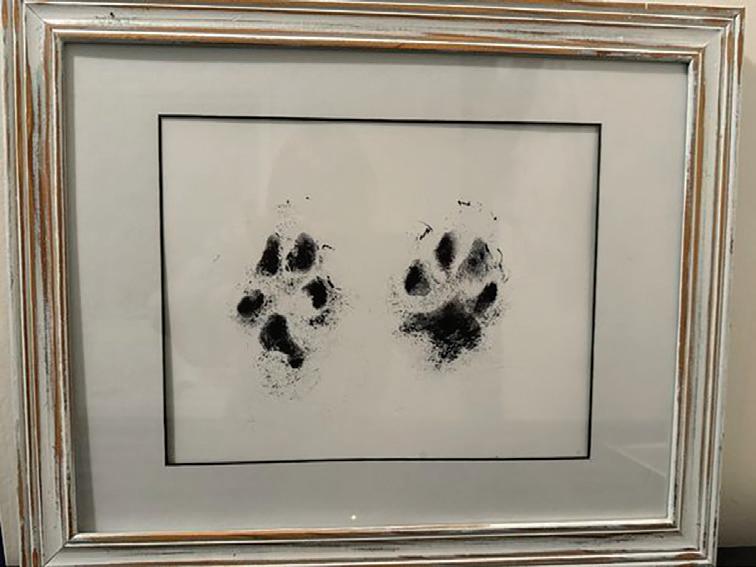

By Gail Sonnesso GEM Adult Day Services, Inc.
Many families have enjoyed the love of a pet dog. They know about the unconditional love, the happy wagging tail and the joy expressed when your furry friend gets a treat.
As we age, sometimes being responsible for the care of a family dog is beyond our abilities. This void can be met with a therapy dog. The delights of interacting with a therapy dog are multiple and varied for all people, including those people living with Alzheimer’s or a related dementia. I did not know that there are more than 50,000 therapy dogs in the U.S.
During my time with GEM, we have met some amazing therapy dogs! We are thrilled that Mary Lou Fahey and Breezy have been volunteering with us.
How does a dog become a certified pet therapy dog? I had no idea so I asked Mary Lou about Breezy and she shared:
“I brought Breezy home when she was just eight weeks old. I had spoken to her breeder about wanting a puppy that had the temperament to become a potential therapy dog and Breezy was chosen because of her outgoing, gentle nature. From the moment she came home, we showered her with love and provided positive reinforcement for the behaviors we wanted her to continue.
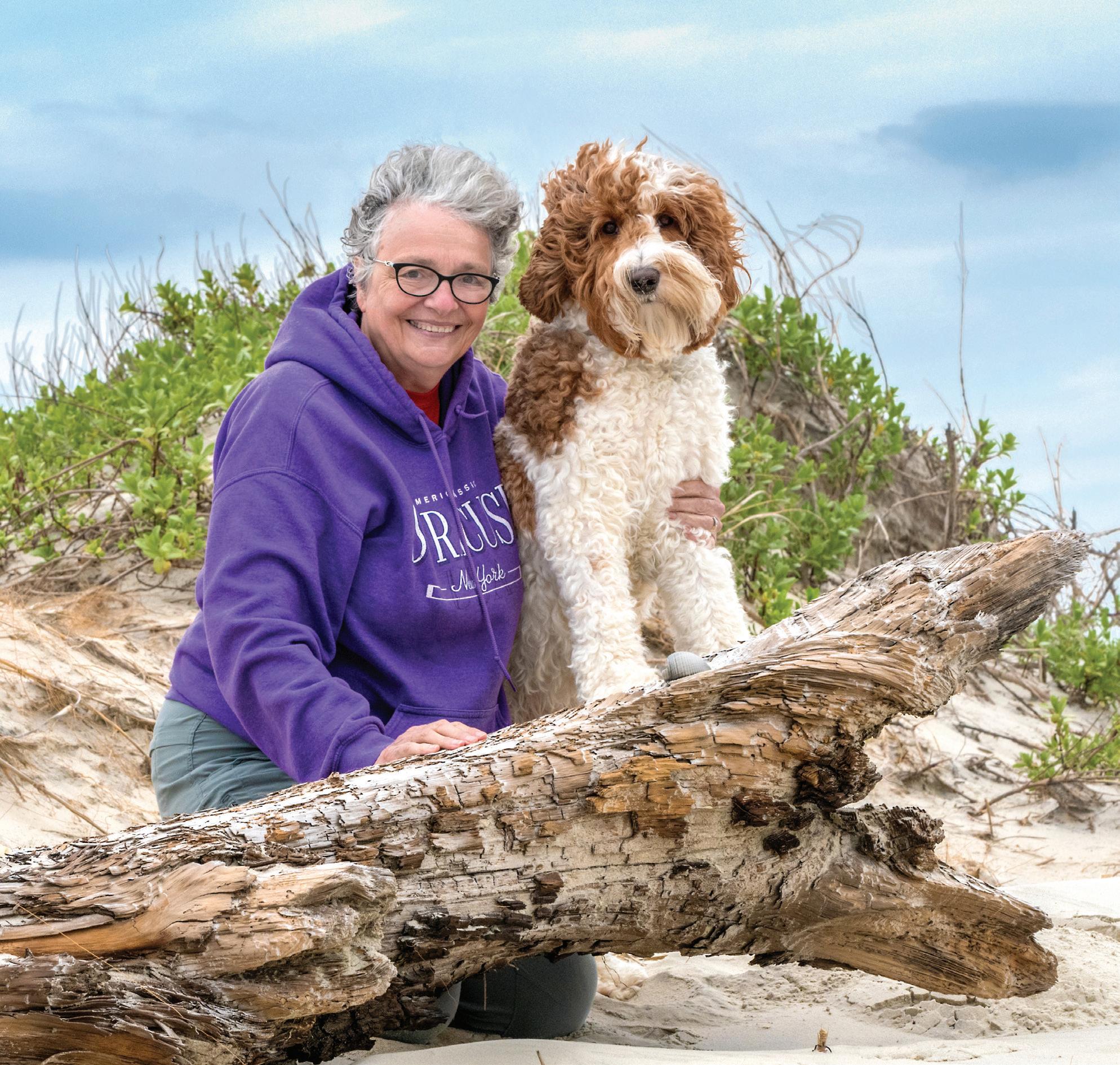
Breezy was trained to visit patients and gently lay just one paw on the bed. Breezy can also “high five” and shake hands. We love our visits with Breezy and Mary Lou says Breezy looks forward to “going to work,” or what we call her visits with us!
People living with dementia are going through progressive stages and sometimes a live dog is not as helpful as an interactive robotic pet. Meet the “Golden Pup” a product of Joy For All Companion Therapy Pets for Alzheimer’s.
“When she was twelve weeks old, Breezy and I began to visit public places to socialize her to a variety of people, places, noises, and environments. We took several classes together, some focused on obedience and others just for fun. These included puppy classes, agility, obedience, and trick classes.
“Breezy earned her Canine Good Citizen certificate through the American Kennel Club (AKC), as well as other certificates. We then successfully
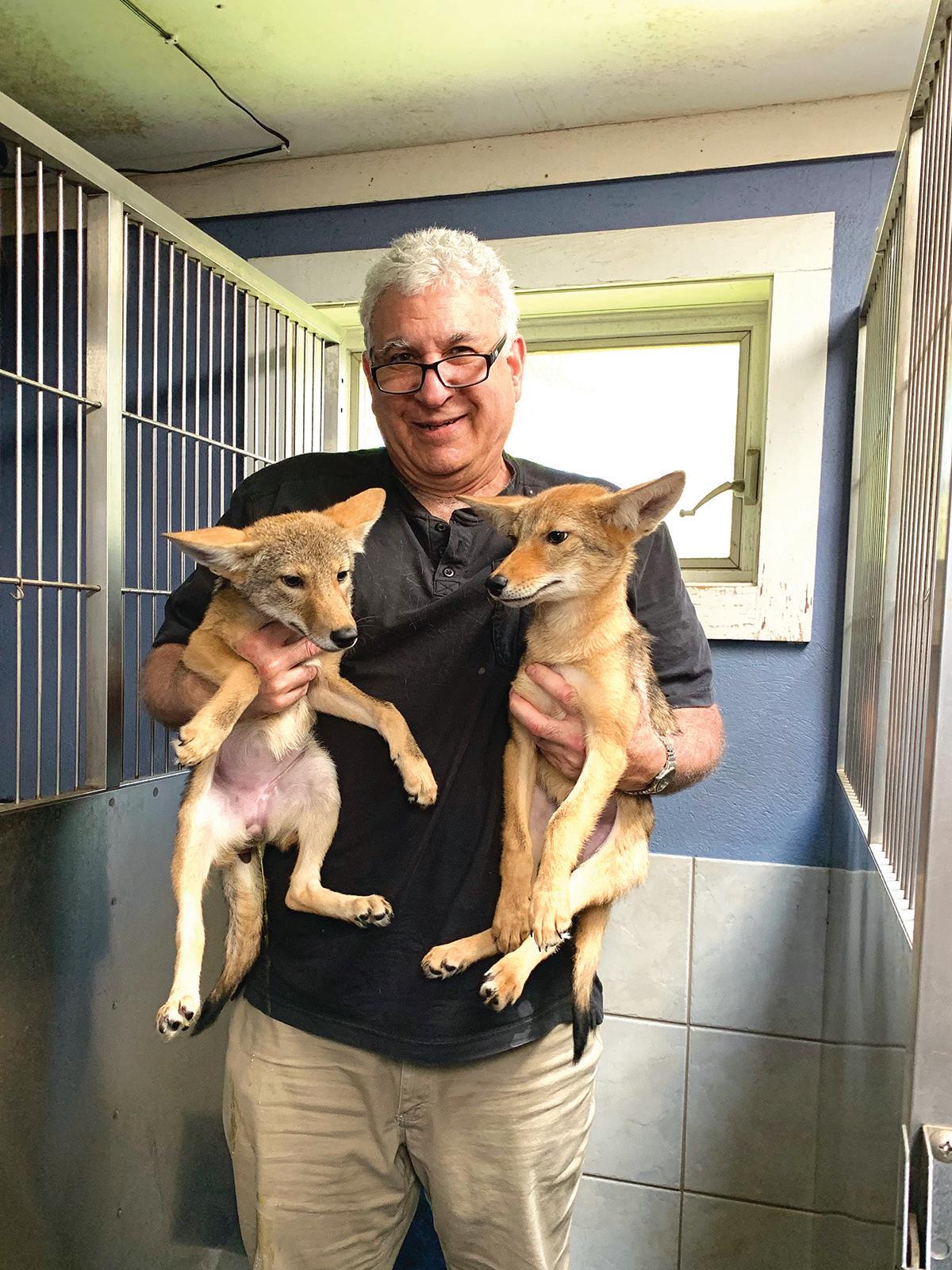
passed a test given by the national organization, Alliance of Therapy Dogs (ATD), which evaluated her ability to behave appropriately in various situations and my ability to guide and partner with her. Once we completed that test, we were required to make three facility visits where we were

observed by a tester to be certain we were both a good fit to become a therapy dog team. I also took classes at the University of Denver to further my education on dog therapy. As part of the team, it is important that I understand dog communication, behaviors, welfare, and stress so that Breezy
has the best experiences possible in our work of bringing joy to those we are visiting.”
When Breezy walks in the room the smiles are everywhere our hands are reaching out to pet her. Breezy accommodates visiting each of us in turn! At a recent Harmony Café we learned that
These “companion pets” are designed to bring comfort, companionship and fun to elder loved ones. They have realistic fur, make pet-like sounds and have sensors that respond to petting and hugs with familiar pet-like actions. Therapy pets have a remarkable effect on individuals in the middle and later stages of Alzheimer’s disease. They are calming, soothing and bring the person back to a time in their life when they felt useful and had a sense of purpose. Alzheimer’s pet therapy helps individuals escape from a world where someone is always caring for them. Pets provide a chance to care for a living therapy dog or an automated Golden Pup! GEM has a Golden Pup (thanks to the Albemarle Commission) in our office if you would like learn more! Our office hours are on Thursdays from 1-3 p.m. Call Gail at 252-380-3354 or email gsonnesso@gmail.com to learn when Breezy will be visiting or about our programming.
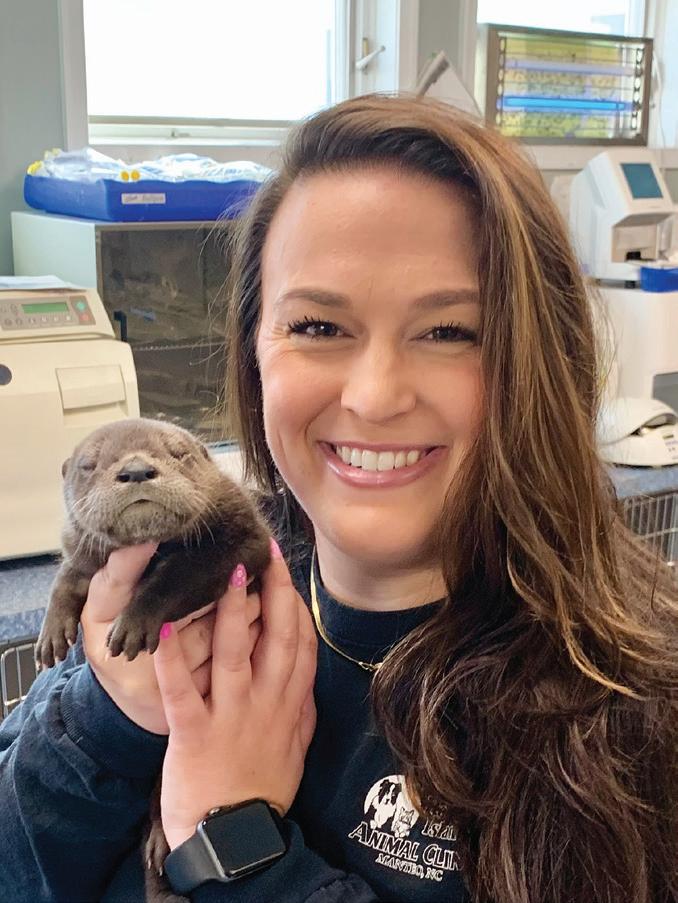
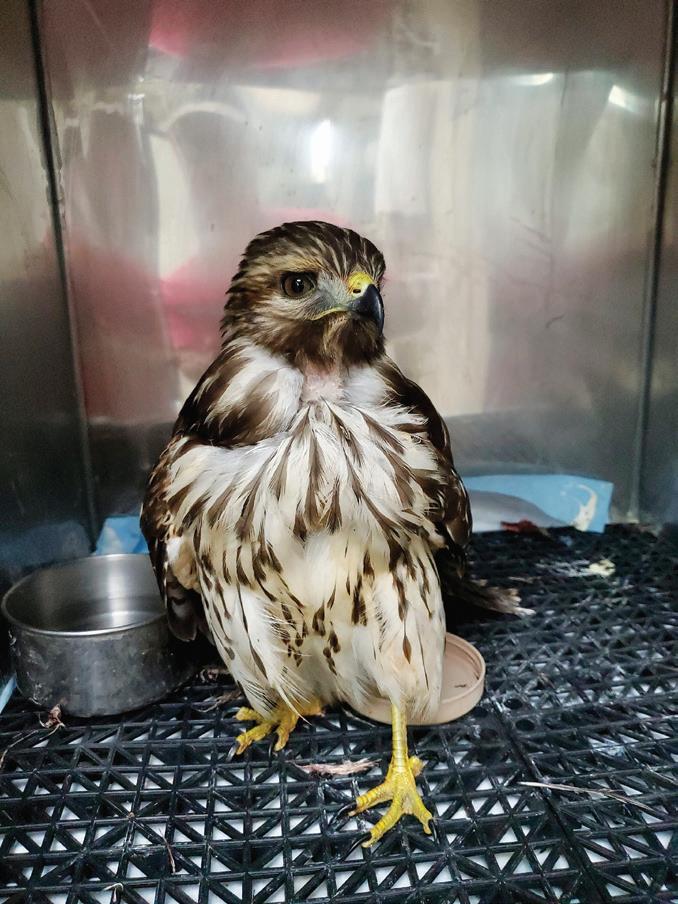


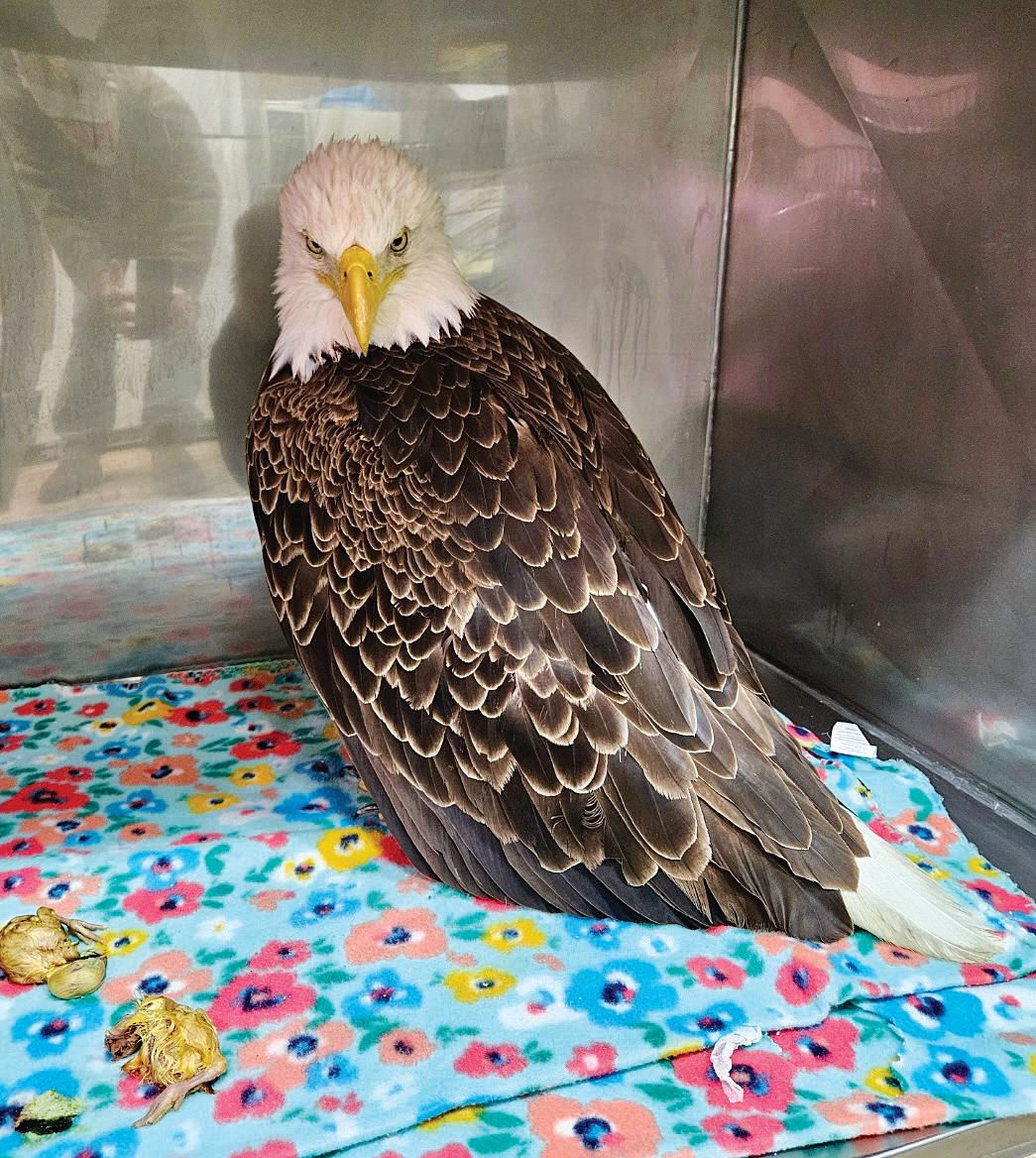

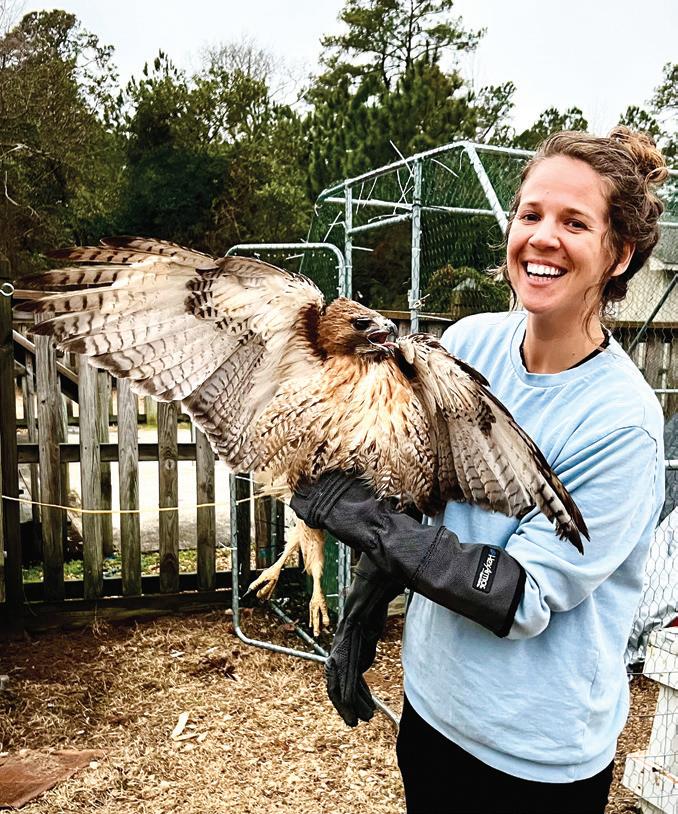


By Deb Johnson Poodles and Bob
Grooming is an essential aspect of responsible pet ownership, and for dogs (and some cats), proper grooming goes far beyond just making them look good. Regular grooming is crucial for maintaining a dog’s overall health and well-being and should be an integral part of your dog care routine.
Regular brushing provides several health benefits. Brushing helps to remove loose fur, dirt and debris from your dog’s coat, promoting healthy skin and coat. For some breeds, brushing is essential to prevent matting of the fur, which can lead to skin infections and discomfort. This is especially
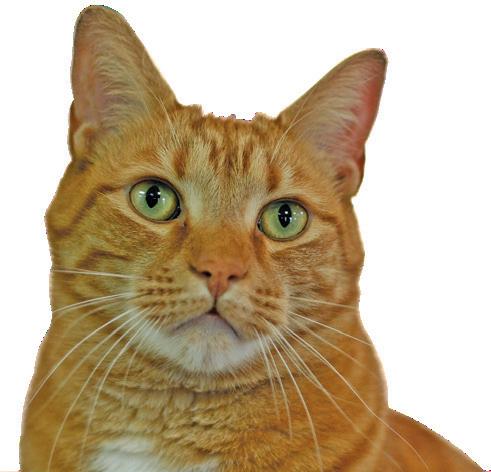
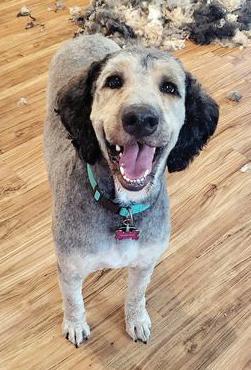
important for breeds with long or curly coats that require regular maintenance to prevent matting and tangles. Brushing also distributes natural oils from the skin, keeping the coat shiny and healthy.
Inspection of the coat during brushing allows
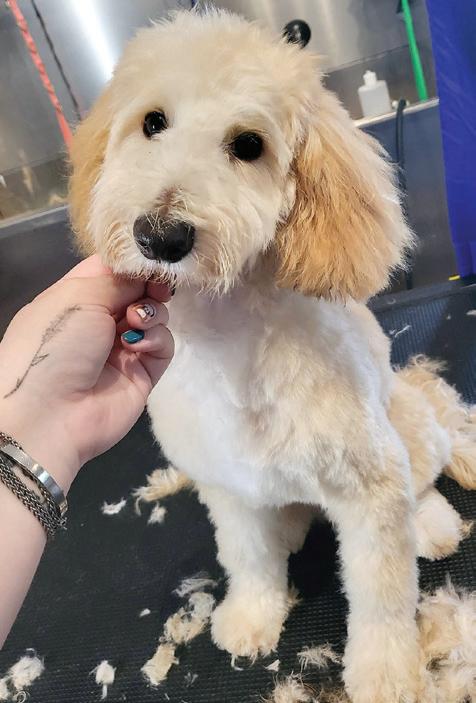
you to check for parasites like fleas and ticks, which can cause serious health problems. Regular brushing and checking can help detect these pests early, before they become a significant issue.
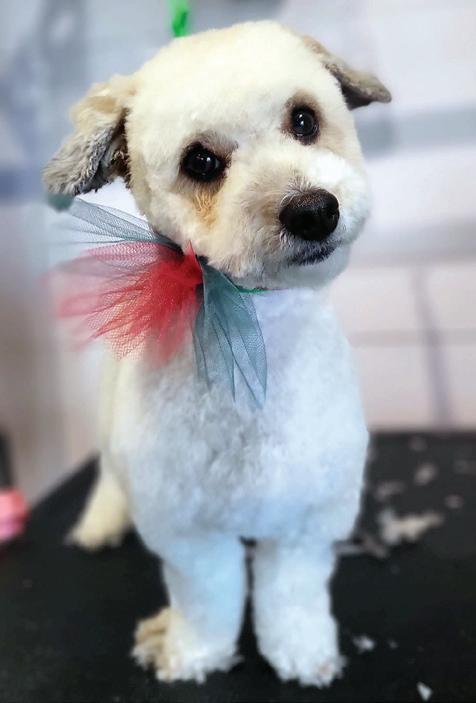
Dogs with floppy ears are prone to ear infections due to trapped moisture and wax buildup. Regular ear cleaning helps prevent infections and keeps the ears dry and healthy.
During grooming, you have a chance to spot signs of potential health issues. This includes lumps, bumps, skin infections, or changes in the coat’s texture and color. Early detection of these issues can lead to prompt veterinary care and a better outcome for your dog’s health.
Overgrown nails can cause pain and lead to mobility issues. Regular nail trimming helps keep your dog comfortable and prevents potential problems with walking and joint health.
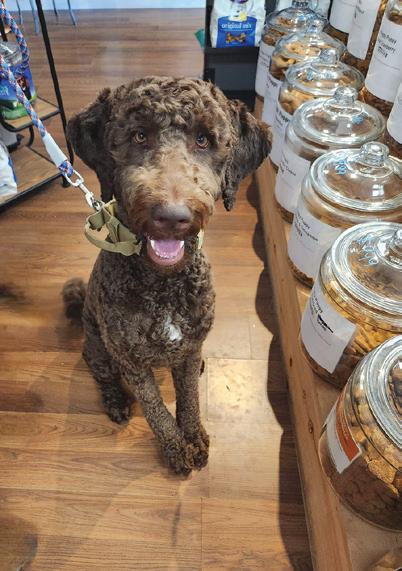
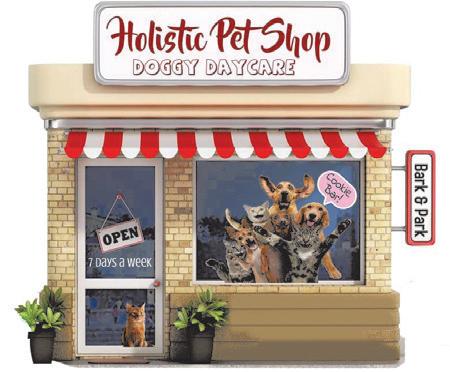
Regular bathing, tailored to your dog’s specific needs, help keep the skin clean and reduce odors. Be mindful of not over-bathing, as it can strip the coat of natural oils.
Brushing your dog’s teeth and providing dental chews or treats can prevent dental disease, which is common in dogs. Dental health is crucial, as untreated dental issues

can lead to more serious health problems.
A consistent grooming routine helps your dog become accustomed to being handled and reduces anxiety during grooming sessions. It also provides an opportunity for socialization and can help your dog become more comfortable with different types of handling and interactions, which is beneficial for behavior.
Tips for effective grooming
• Start Early: Introduce grooming to your puppy early to get them used to the process. This helps in establishing a routine and reduces stress for both you and your dog. Many groomers offer “Puppy Packs” designed to create positive initial grooming experiences for your puppy.
• Use the Right Tools: If grooming at home, invest in high-quality grooming tools appropriate for your dog’s coat type. This includes brushes, combs, clippers and nail trimmers.
• Professional Grooming: For complex grooming needs, such as those required by certain breeds, consider professional groomers. They can handle intricate cuts and styles, and provide services that might be challenging for a pet owner to do at home.
• Be Gentle and Patient: Grooming should be a positive experience for your dog. If considering a professional groomer, be sure to inspect the grooming facility and groomers to be sure that the environment is a good fit for your pet.
Grooming is an essential part of keeping your dog healthy and happy. It goes beyond just aesthetics; it’s about ensuring your pet’s overall well-being. Poodles and Bob Spa can help! We offer full grooming services including the “Puppy Pack.” Call our groomer, Caroline, to schedule your pup’s grooming appointment at 252-580-7498.
By Dr. Mark Grossman Roanoke Island Animal Clinic
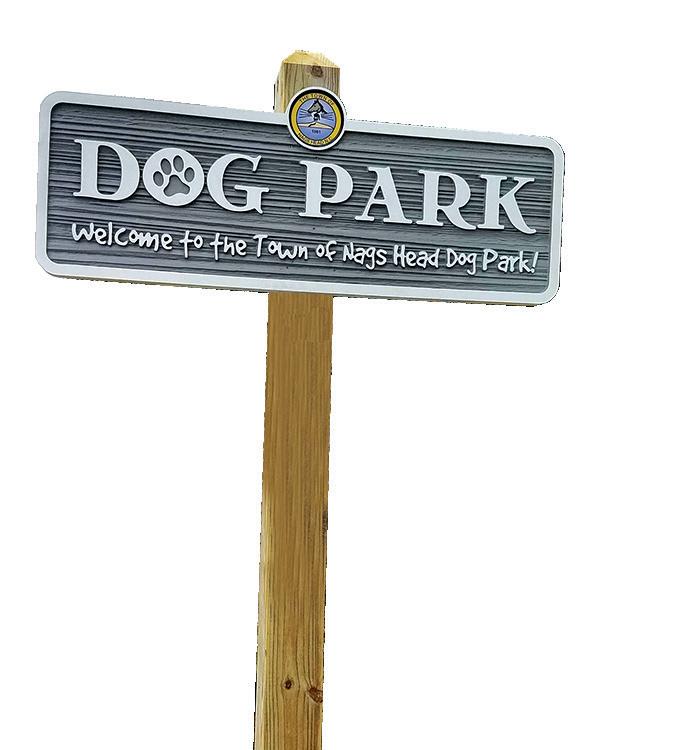
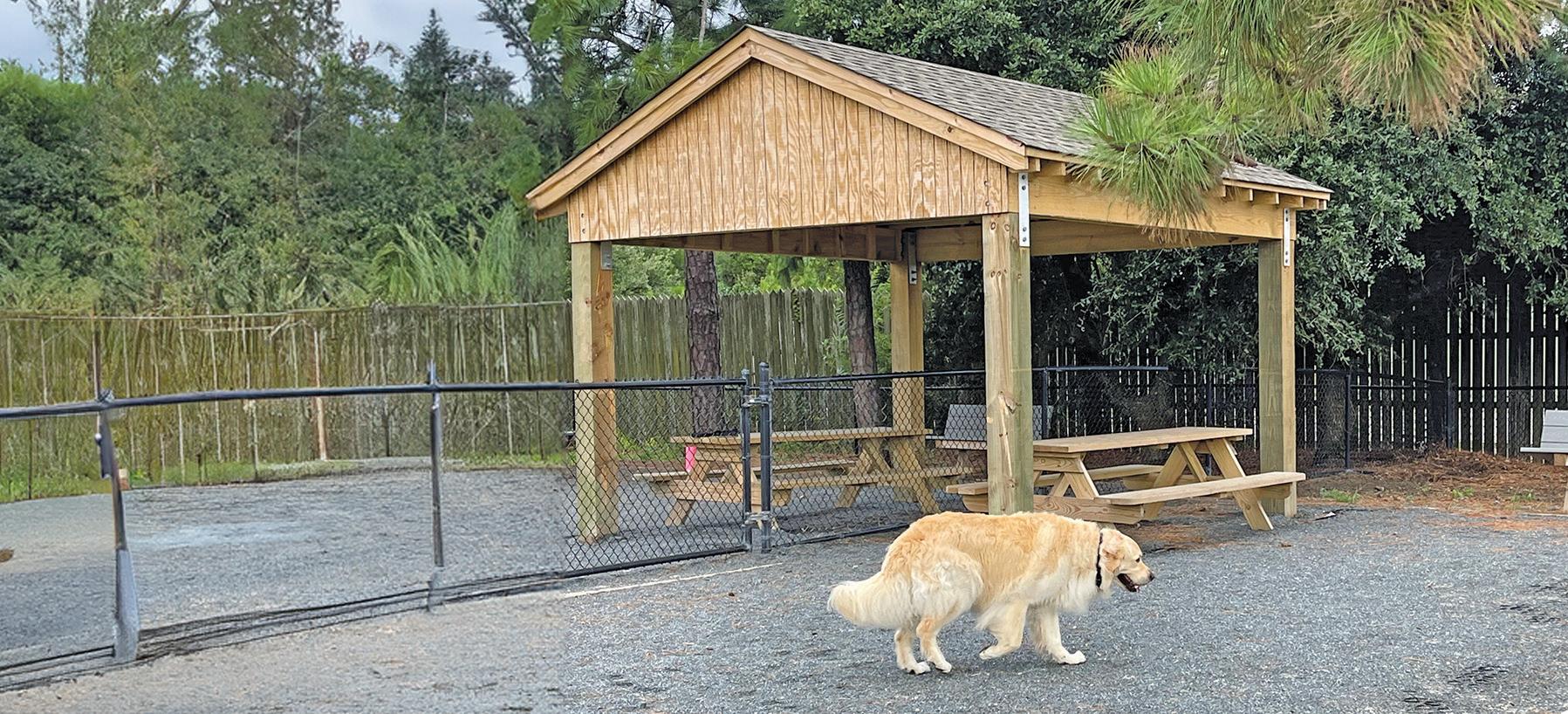

As you have probably heard, we have confirmed diagnoses of several dogs with K-9 flu. Here’s what dog owners should know about this canine disease. Canine influenza was first documented in Florida in 2004. Since then, there have been various outbreaks around the country.
At that time, and since then, we have had no documented cases in Dare County. The vaccine has been available for years. Many veterinary immunologists at the time were saying getting the vaccine was a “lifestyle” choice. In other words, if you and your dog travels around the country or participates in shows, the vaccine would have been a reasonable choice. But we were not routinely using the vaccine since there was no cases in Dare and the surrounding counties.
Now that has changed. No one should be
surprised that K-9 flu has made its way to Dare County. However, it’s a little more complicated than just the flu being here. This last year or so, we have been seeing some nasty kennel cough (infectious tracheobronchitis) cases that were not the flu. They tested positive for Bordetella, several viruses (not the flu), and mycoplasma (a bacteria). These cases responded well to treatment.
Then we got a dog that came in with a snotty nose and a cough. That dog tested positive for the flu.
Since then, we’ve seen a few suspected cases on Roanoke Island and a few from the northern beaches as well as Hyde County and some suspicious cases from Virginia.
There are two forms of canine flu. A mild form and a severe form.
The mild form is very similar to kennel cough and responds to symptomatic and supportive care. The severe form can
make these dogs very sick. They come in without eating, coughing, a runny nose and a fever. The severe form can progress to pneumonia. These dogs often require hospitalization and more aggressive fluid and antibiotic therapy. And as with the human flu, older and compromised dogs can succumb to this disease. The good news is the vaccination is very effective and readily available.
If your dog spends lots of time outdoors and especially if he/she travels or goes to dog parks or shows, I would have him/ her vaccinated. The vaccine requires one immunization then a booster in two weeks. Then it is an annual booster.
If your dog starts coughing, see your veterinarian. Remember there can be many other reasons for dogs to cough.
If your dog gets diagnosed with the flu or other respiratory disease, keep them from other dogs for two to three weeks. K-9

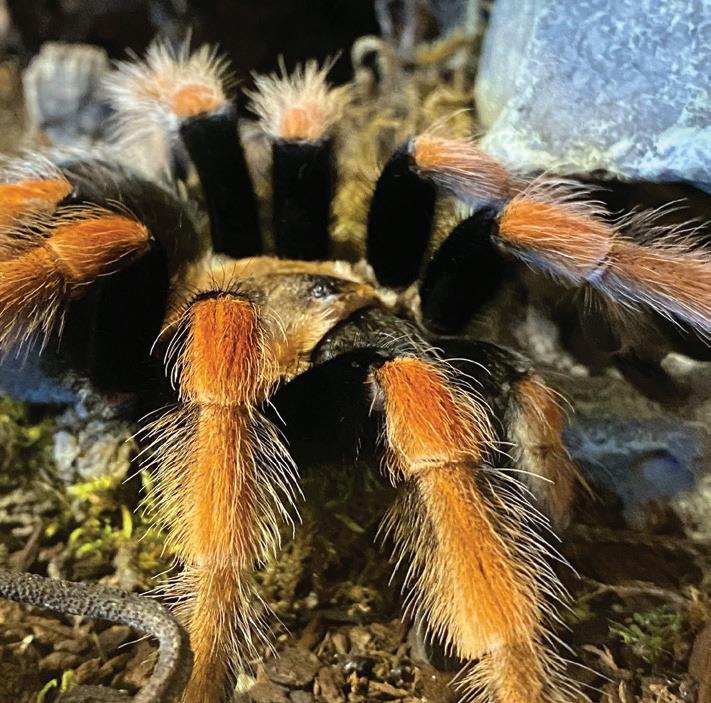
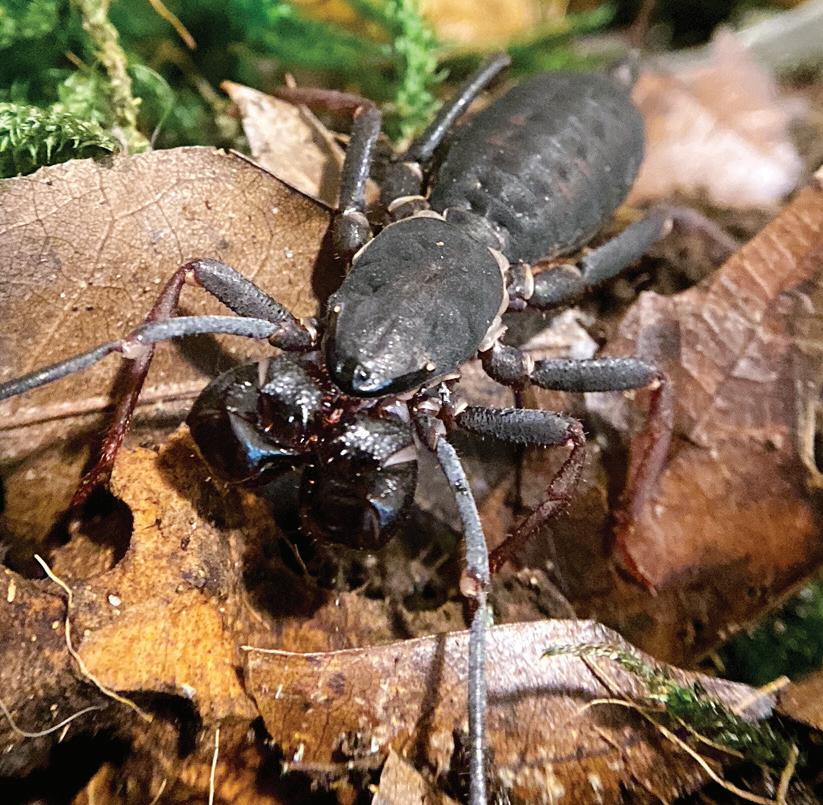
By Elaine Hooper Hatteras Island Pet Resort
I am the proud parent of over 60 pets. Five of them, my two dogs and three cats, enjoy varying levels of affection and attention, actively seeking out my presence for a game of tug or a tender belly rub. The other 55-plus scarcely know I exist. The largest of these is the size of my hand with my fingers stretched as far as they can reach; the smallest I can hardly see without a magnifying lens.
You see, I have fallen head-over-opisthosoma in love with the keeping and care of invertebrates:
• 25 tarantulas
• 2 other mygalomorph spiders
• 23 araneomorph or “true” spiders
• 5 blue death-feigning beetles
• a vinegarroon
• and a colony of isopods (AKA roly-polies).
The vinegarroon? I’m glad you asked. Vinegarroons are arachnids of the order Uropygi. They have strong pincers in front, a set of probe-like legs they use to “see” their way around, six walking legs, and a tail-like flagellum that squirts concentrated acetic acid (i.e. vinegar)
from its base, their only defense mechanism. They hunt small insects, grabbing and crushing them with their pincers, and they have no venom.
Blue death-feigning beetles are the opossums of the bug world. When disturbed or startled, they stiffen and appear dead. They play their part so convincingly that I thought one of mine had passed away last week, only to find it an hour later happily munching on a piece of popcorn.
The spiders, though, are what people wonder about most. Why would any person have that many spiders? Simply put, because they’re beautiful. They come in an array of bright oranges, deep blacks, warm pinks, and iridescent blues. Some have striking patterns, others lay intricate sheets of lacelike webbing, and several sport luscious tresses of hair-like setae that give them a friendly, fluffy appearance. Many remain nearly permanently hidden in burrows, deep tunnels of web, or thick vegetation. At least two I have never seen fully. They are timid creatures, far more afraid of us than we are of them. When I am graced with a glance
of their glorious selves, it makes me feel special, like I’ve been let in on a world-changing secret. And world-changing it has been. Caring for such non-traditional pets has opened my eyes onto the careful balance of true nature, the wild and fierce force that impartially governs the fate of all living things. Nature does not favor one individual organism over another, there are no evil villains or righteous heroes. Each end, each demise, means that something else can continue to thrive until it, in turn, provides sustenance for another life.
Educating myself on the needs of my miniature menagerie has taught me to observe carefully. Even though they can’t talk to me, a close look will tell me if they need to be fed, if they need more peace and quiet, or if they’re about to go into a molting cycle where they’ll shed their skin to grow.
Most of all, loving lifeforms that do not and cannot love me back has nurtured selflessness in me. I do not tend to them expecting any affection in return; I do it because these small, seemingly insignificant lives depend on me to do so.
By Pam Anderson Rainbow Bridge Pet Cremation
We share our life with family who loves our stinky breath, because their breath stinks, too.
We share our life with family who has no respect for personal space or the meaning of bathroom privacy.
We share our life with family whose eyes sparkle when they see us. But all too soon, we have to say “Until we see you again.”
Sometimes our pets pass unexpectedly or they experience an illness, other times they pass from age. When we are faced with this difficult journey, the grief can sometimes seem overwhelming. As a pet loss professional consultant and private pet crematory service, I suggest to taking a breath. Take some time before making decisions about our pets’ post life care. The decision is final and too important to rush when we are raw with grief. Just take a breath.
Once we feel ready to move forward with our pets’ post life arrangements, a veterinarian, pet loss consultant, or private cremation service can assist and provide support and guidance. Generally, veterinarians will take care of all the arrangements with an outside cremation service they have a relationship with. This type of service usually offers standard memorial items without an option to individualize or take special requests. When a pet loss professional is consulted, they will provide all the available options for post life care including burial, cremation
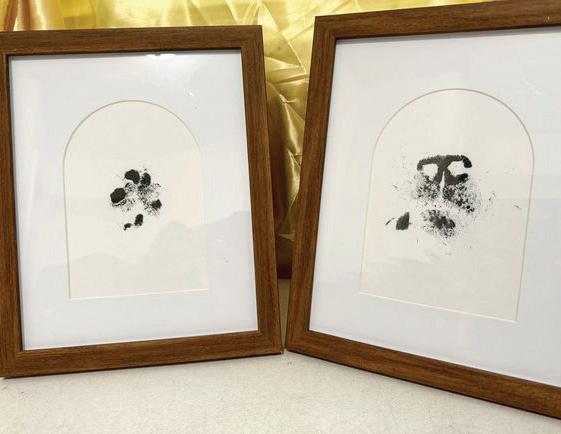
and aquamation. They will also assist with planning celebration of life get-togethers, designing and planning unique memorials, and offer grief support information. Another option is to work directly with a pet crematory business, which can be less expensive and offer the availability to design and individualize the memorial items. When choosing a pet cremation business, whether it’s one used by a veterinarian or one you choose, make sure they are members of the International Association of Pet Cemeteries and Crematories.
During this time, we also may find we need support for ourselves and family emotionally and financially. The American Veterinary Medical Association’s website has resources for working through grief with their animal loss support services. For children, this can be an especially difficult time and consulting with a guidance counselor or mental health professional can offer useful tips for navigating the pet loss. When financial assistance is needed to help with end of life care
for euthanasia and cremation, Coastal Humane Society offers assistance.
While the final journey with our pets is difficult, none of us would give up a second of the time we spent together, and we will cherish our memories in our hearts forever. Knowing the resources available and having the support from friends and family during our pets’ final journey will help us through the grief process “when the time comes.”
• International Association of Pet Cemeteries and Crematories – iaopc. com
• American Veterinary Association – avma. org, avma.org/resources-tools/pet-owners/ petcare/coping-loss-pet
• Coastal Humane Society – obxcoastalhumanesociety.org
• Rainbow Bridge Pet Cremation & Pet Loss Consultant – rainbowbridgeobx.com
thecoastlandtimes.com
thecoastlandtimes.com thecoastlandtimes.com thecoastlandtimes.com thecoastlandtimes.com







By Angelo Sonnesso
As a music therapist, I often witness the profound impact that music has on the emotional and physical well-being of older adults. However, music isn’t the only form of therapy that can bring joy and healing to this population. Pet therapy, also known as animal-assisted therapy, is another powerful tool that offers a wealth of benefits for older adults.
What is Pet Therapy?
Pet therapy involves the interaction between humans and trained animals, such as dogs, cats, rabbits or even horses. These interactions can occur in various settings, including senior living facilities, hospitals and private homes.
Benefits of Pet Therapy for Older Adults
• Reduced Stress and Anxiety: The simple act of petting an animal can lower blood pressure, reduce heart rate, and decrease cortisol levels, the stress hormone. This can be particularly beneficial for older adults who may experience anxiety or depression.
• Increased Social Interaction: Pet therapy sessions often involve group activities, providing opportunities for older adults to socialize and connect with others. This can combat feelings of loneliness and isolation, common issues among seniors.
• Enhanced Physical Activity: Walking a dog or playing with a cat can encourage gentle exercise, improving mobility, balance and overall physical fitness.
• Cognitive Stimulation: Interacting with an animal can stimulate memory and cognitive function. Older adults may remember past pets or share stories about their experiences with animals, promoting mental engagement.
How Music Therapy and Pet Therapy
Complement Each Other
As a music therapist, I’ve seen firsthand how music and pet therapy can work together to enhance the therapeutic experience for older adults. For example, playing calming music during a pet therapy session can further reduce anxiety and promote relaxation. Additionally, singing or playing instruments with an animal present can create a unique and joyful bonding experience.
Conclusion
Pet therapy is a valuable and often underutilized tool that can significantly improve the quality of life for older adults. Whether it’s the unconditional love of a dog, the comforting purr of a cat, or the gentle nuzzle of a rabbit, the connection between humans and animals has the power to heal, comfort and bring joy to those in their golden years. As a music therapist, I encourage everyone to explore the possibilities of pet therapy and discover the incredible benefits it can offer to our aging population.
• Improved Mood and Emotional Well-being: The companionship of an animal can provide comfort, joy and a sense of purpose. This can be especially helpful for older adults who may be experiencing grief, loss or a decline in physical abilities.
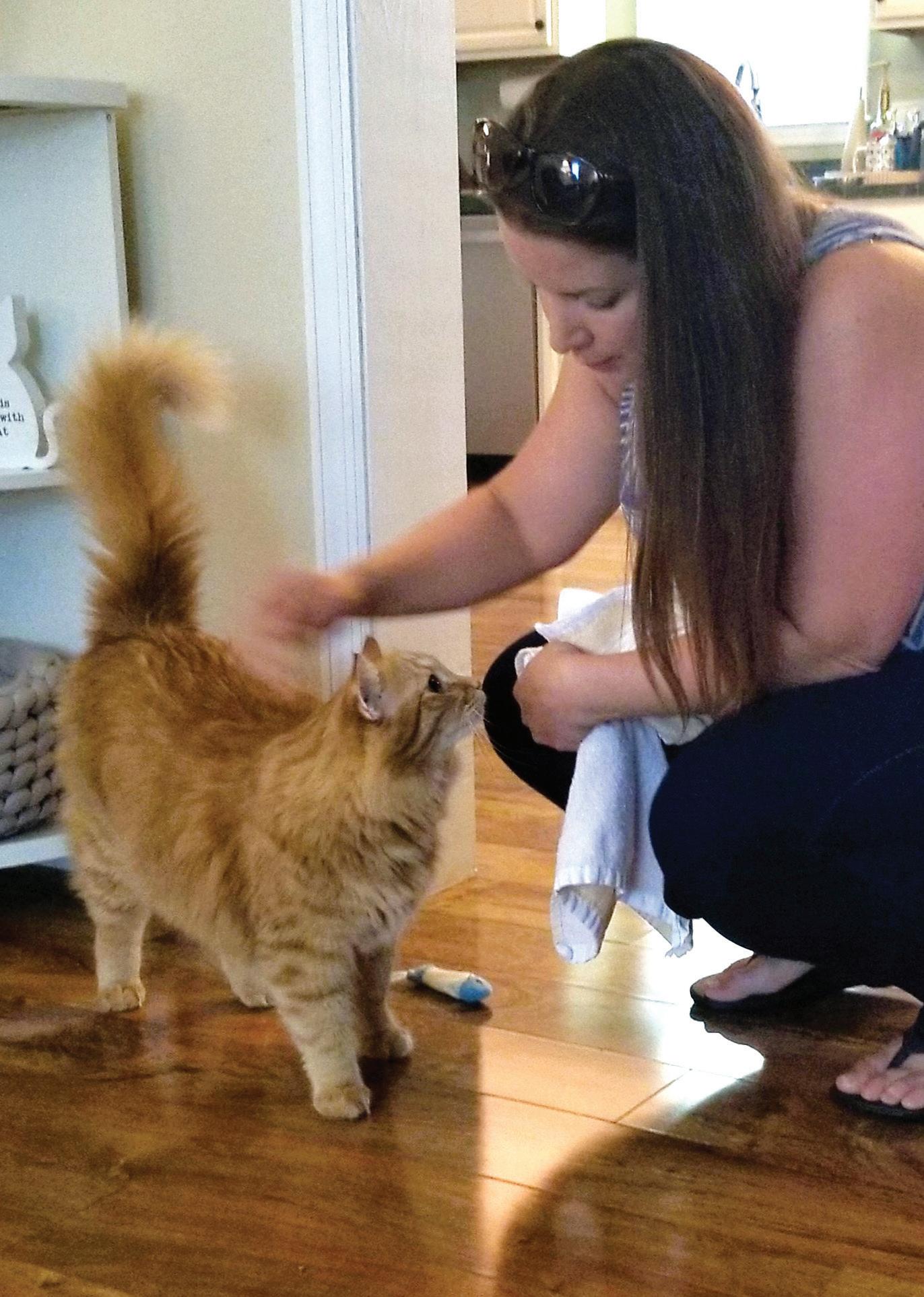

their dog will see that I’m welcome and accepted by their owners,” she explained.
takes pictures so she’s not calling pets by the wrong name)
• Vet contact information and any medical concerns or medication needed
• Daily routine
• Favorite treats and toys
• House rules (for example, are dogs allowed on the furniture, or are they kenneled at night?)
• How to access the house (lock box, security systems, etc.)
• Commands used, especially helpful for puppies in training
• Temperament (is pet shy or outgoing, anxious or high energy?)
When selecting a pet sitter, Burr said it’s important that both the owners and the pets feel comfortable with the sitter. “I want your pets to know I’m welcome in their space. You do want to want to watch that interaction. Some dogs are really choosy about who they like,” she said.
“Sometimes I’ll take the dogs for a walk with the owners present and I’ll hold the leash. Then
“With really nervous dogs there are usually a lot of treats involved at the first meeting … once a dog gets warmed up, the owners will usually let me know.”
Burr is insured and also trained in pet first aid, including CPR. While she’s thankful she’s never needed to use it, she’s well prepared in the event of an emergency.
As much as Burr does for the pets in her care, she’ll be the first to tell you how much she benefits from time she spends with them.
“They kind of come out of their shells,” she said. “They all have these unique quirks and personalities you get to know and love. They have so much to love to give not only their owners but to other people as well.”
Last fall, Burr’s beloved elderly dog passed away. “We knew it was coming,” she explained. “But it was really tough to watch. It was exhausting and difficult.” Right after she said goodbye to
Athena at the vet’s office, she happened to be previously scheduled to dog sit for Winnie and Birdie – two dogs she knows well and watches several times a year.
“And they just knew,” she said.
“I was sitting on the stairs off the back porch. They were running around after dinner and one dog comes up to one side of me and the other dog comes up to the other side of me and they leaned in. I started crying again and they were just so comforting to me.”
At around the same time, Burr began working with a new client. Nala was shy the first couple of visits, but she quickly warmed up. Nala is a high energy pup and her owners were okay with Burr taking her on nature walks or out to the beach. These were things Burr had missed doing with her dog while she was sick.
“She had so many quirks that reminded me of Athena. Even though I was missing my dog you can’t not be happy when this dog comes to the door and is happy to see you. They don’t even have to try they just brighten your day.”



